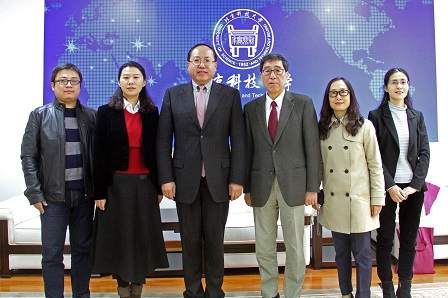

Photo news
On October 26, President Guo Wei of City University of Hong Kong led a delegation to visit USTB. The visitors were met by USTB President Zhang Xinxin, and the two sides engaged in in-depth discussions regarding collaborative efforts.
President Zhang began by welcoming President Guo and his colleagues, and proceeded to brief them regarding USTB’s history, development, and future prospects. President Guo expressed his thanks for the warm hospitality and appreciation for USTB’s achievements.
Following that President Guo attended a seminar on “dual-class university construction”. The meeting was chaired by USTB Vice President Wu Aixiang, who briefed the guests on USTB’s efforts in the field. President Guo is a member of the United States National Academy of Engineering, an academician of the Chinese Academy of Engineering, and a foreign academician of the Russian Academy of Engineering. He has previously served as a senior manager at the U.S. Oak Ridge National Laboratory, Dean of the School of Engineering at the University of Tennessee, and director of the Department of Industrial Engineering at Texas A & M University. He is also currently responsible for the management of industrial and biomedical engineering. President Guo specializes in systems engineering and is considered an early pioneer of electronic research, having produced a number of classic works on system reliability and electronic products testing, having helped to set international standards.
Afterwards President Zhang delivered a speech thanking President Guo for taking the time to visit USTB, while praising him for his valued leadership in helping to make City University of Hong Kong one of the top universities in the world. Following a warm round of applause, President Guo delivered a thought-provoking report on the advancement of “dual-class university construction” on the Mainland. Upon the conclusion there was a discussion including the deans and university heads.

 Quicklinks
QuicklinksCopyright © 2011 Office of International Office & Office of H. K., Macao & Taiwan Affairs,
University of Science & Technology Beijing